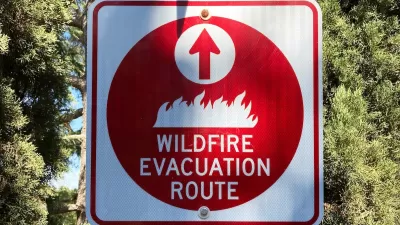The way Congress has appropriated funds for the prevention of forest fires, and fighting forest fires when they occur, guarantees that they will become more costly and dangerous in the future.
According to an article by Brad Plumer, "this will be the 7th time in the last 12 years that Congress hasn't adequately funded federal firefighting programs. Since 2002, the Department of Agriculture, which runs the Forest Service, has had to pull at least $2.8 billion from other programs in order to fight fires — without always getting fully reimbursed by Congress. And the problem is only likely to get worse in the years ahead."
Moreover, "the US Forest Service and Department of Interior expect they'll have to pull $470 million from other accounts — including programs that are supposed to help prevent fires in the first place. That, in turn, could make future wildfires even worse."
The article goes on to cover the growing size ("wildfires in the western United States grew at a rate of 90,000 acres per year between 1984 and 2011") and costs—and how poorly the country is prepared for the future of fires in the country.
Plumer also mentions two pieces of potential legislation that could change the way the federal government funds fire suppression efforts. One is a bill in the House by Rep. Mike Simpson (R-ID) and Kurt Schrader (D-OR) that would set predictable firefighting and prevention budgets, and allot overruns on a given year from emergency disaster bills. The Obama Administration has also recently proposed a special fund for especially high fire costs.
FULL STORY: Why the US is always so unprepared to fight wildfires

Planetizen Federal Action Tracker
A weekly monitor of how Trump’s orders and actions are impacting planners and planning in America.

Chicago’s Ghost Rails
Just beneath the surface of the modern city lie the remnants of its expansive early 20th-century streetcar system.

San Antonio and Austin are Fusing Into one Massive Megaregion
The region spanning the two central Texas cities is growing fast, posing challenges for local infrastructure and water supplies.

Since Zion's Shuttles Went Electric “The Smog is Gone”
Visitors to Zion National Park can enjoy the canyon via the nation’s first fully electric park shuttle system.

Trump Distributing DOT Safety Funds at 1/10 Rate of Biden
Funds for Safe Streets and other transportation safety and equity programs are being held up by administrative reviews and conflicts with the Trump administration’s priorities.

German Cities Subsidize Taxis for Women Amid Wave of Violence
Free or low-cost taxi rides can help women navigate cities more safely, but critics say the programs don't address the root causes of violence against women.
Urban Design for Planners 1: Software Tools
This six-course series explores essential urban design concepts using open source software and equips planners with the tools they need to participate fully in the urban design process.
Planning for Universal Design
Learn the tools for implementing Universal Design in planning regulations.
planning NEXT
Appalachian Highlands Housing Partners
Mpact (founded as Rail~Volution)
City of Camden Redevelopment Agency
City of Astoria
City of Portland
City of Laramie




























